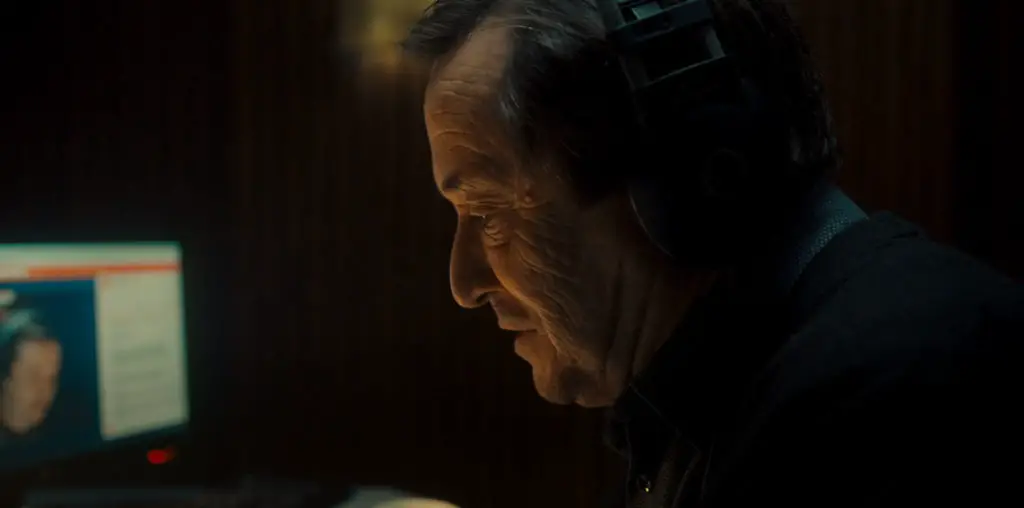
William (Will Brittain) is a neanderthal, cloned from the DNA of a prehistoric-era corpse discovered in a perfectly preserved state in a Pacific Northwest wetland.
He’s a lot like us, but also, he isn’t – his stature is bulky and his brow line is noticeably pronounced, but, more importantly, he just doesn’t quite perceive the world in the same way that modern-era homo sapiens do.
That’s the crux of director/co-writer Tim Disney’s offbeat drama William, a movie that endeavors to tell a very human story about a character whose humanity is undeniable, but also undeniably a little different. Devoid of context, its premise might conjure up impressions of mad-science horror B-movies or slapstick fish-out-of-water comedies, but William makes the rather bold choice to play this story straight – and in doing so, it ends up being a striking, often quite endearing film.

“…a neanderthal, cloned from the DNA of a prehistoric-era corpse discovered in a perfectly preserved state…”
Disney (great-nephew of Walt, because someone was bound to ask) frames the movie as a sort of coming-of-age tale, in which William – fresh out of high school – seeks acceptance as a student into the very same university at which he was cloned (he’s “the ultimate affirmative action case,” as a high school buddy of his jokes). Though he does face the prejudices and prying eyes of a curious world that can’t help but see him as an outsider, it’s William’s own intellectual and philosophical challenges that prove to be the greater obstacle. He’s actually a gifted student and incredibly intelligent, but he’s limited in his capacity to comprehend abstract ideas like linguistic metaphors – the need for which would, obviously, be completely lost on the more practical, survival-oriented brains of a non-civilized species. Nevertheless, he sees college as a major step toward the self-actualization he desires.
The film also tells William’s story up to that point in flashback, using a series of particularly good child actors to chronicle several different stages of his early life. William’s creation is the scientifically daunting and ethically controversial project of brilliant, married researchers Barbara Sullivan (Maria Dizzia) and Julian Reed (Waleed Zuaiter), who choose to raise the Neanderthal child as their own son. Once the initial hype around William’s existence dies down, Julian remains committed to studying him at the university lab; Barbara, meanwhile, wants him to fully integrate into society and lead a normal life despite his obvious but, in many ways, negligible differences from average people. The couple eventually separates, and Barbara raises William in a small town on a remote Oregonian island, where he’s able to grow up in about as “normal” a way as could possibly be hoped for.

“…their characterization of William is so effectively realized – strong, sympathetic, and full of surprising depth…”
William‘s screenplay (written by Disney and J.T. Allen) isn’t able to completely avoid cliches (like, for example, some stereotypical bullies who harass their “caveman” classmate), but it does find a nice balance between exploring the ramifications of a real-life neanderthal walking among us and the more relatable internal conflicts that William has to navigate. The film doesn’t quite have the breadth to address all of the moral and legal issues inherent in bringing an extinct human species back to life, but it doesn’t hand-wave them away, either – they’re the focus of many of William‘s early sequences, and the thorny questions raised about William’s creation are intriguing and well-expressed. Eventually, though, the movie comes to zero in on William himself, leaving the big-picture ideas mostly in the background as it develops the more personal, emotional threads of its story.
That’s a good move on the filmmakers’ part, especially because their characterization of William is so effectively realized – strong, sympathetic, and full of surprising depth, aided tremendously by a restrained and heartfelt performance from Brittain. It’s sort of amazing, at times, how William is able to overcome the outlandishness of its central conceit with its smart, subtle choices (the script is even self-aware enough to make a reference to Encino Man). There are so many aspects of this story that could have come off as laughable if they weren’t handled correctly – from the FX makeup work to the (refreshingly understated) portrayal of William’s social interactions as a high school student – but William is careful to sidestep melodramatics and not push viewers’ suspension of disbelief too far.
As admirable as that approach is, however, that makes it particularly disappointing that the film’s ending feels misjudged in comparison, a missed opportunity to bring things to a resonant and satisfying close. William is so engaging on an intellectual and emotional level for so long that it’s a shame to see it go out on such a sour, out-of-place note, but, ultimately, the conclusion is a misstep, not a deal-breaker. This is a unique, well-acted, handsomely produced movie, overall, the kind of thoughtful and wholesome, high-concept drama that you don’t see much, anymore. Major studios sometimes made movies like this a few decades ago, but today, even within the independent film landscape, William quite admirably stands out like a sore thumb – or, more appropriately, like an unusually large, sloping forehead.

William (2019) Directed by Tim Disney. Written by Disney and J.T. Allen. Starring Will Brittain, Maria Dizzia, Waleed Zuaiter, Susan Park, Paul Guilfoyle, Beth Grant, Finn Haney, Kevin Dzah
7.5 out of 10

